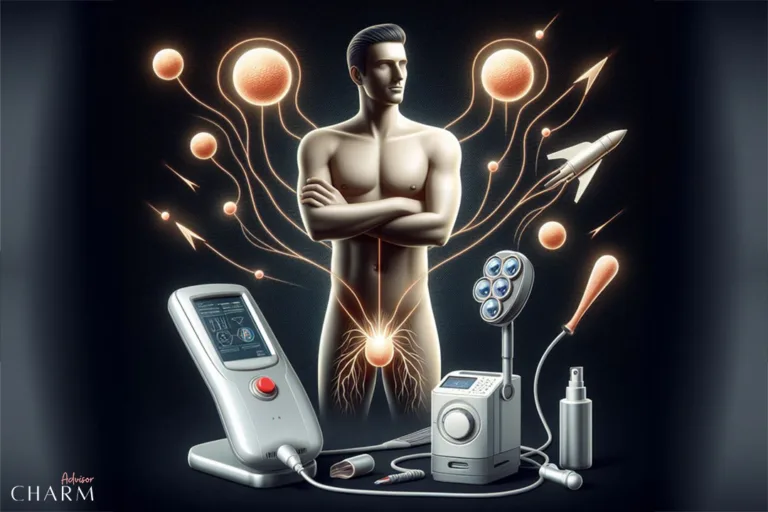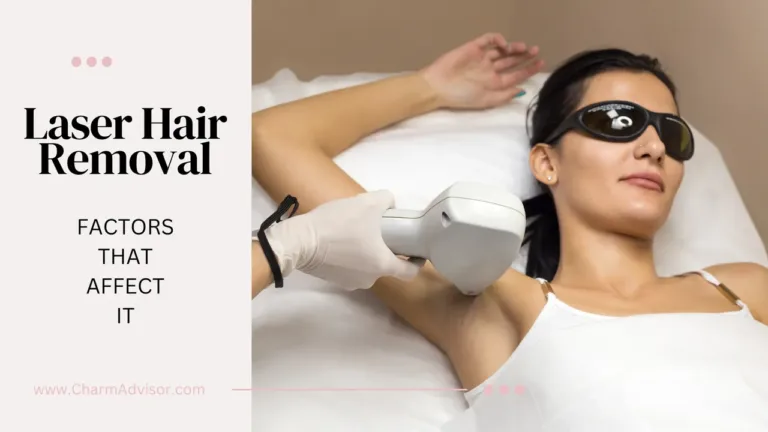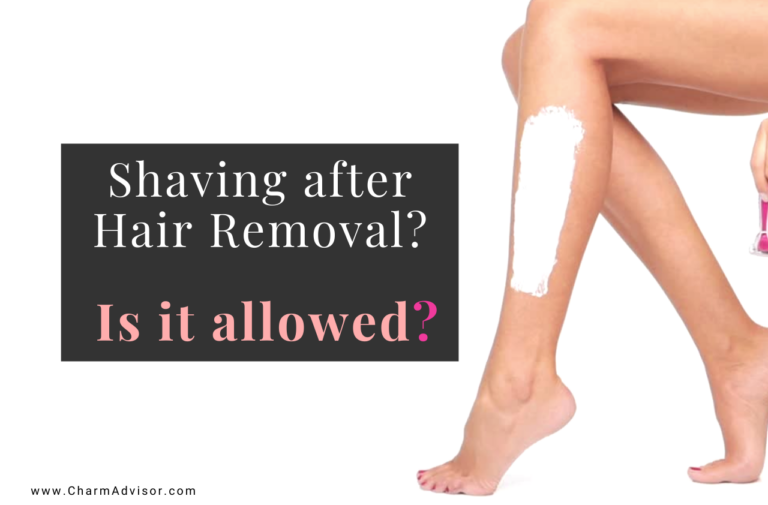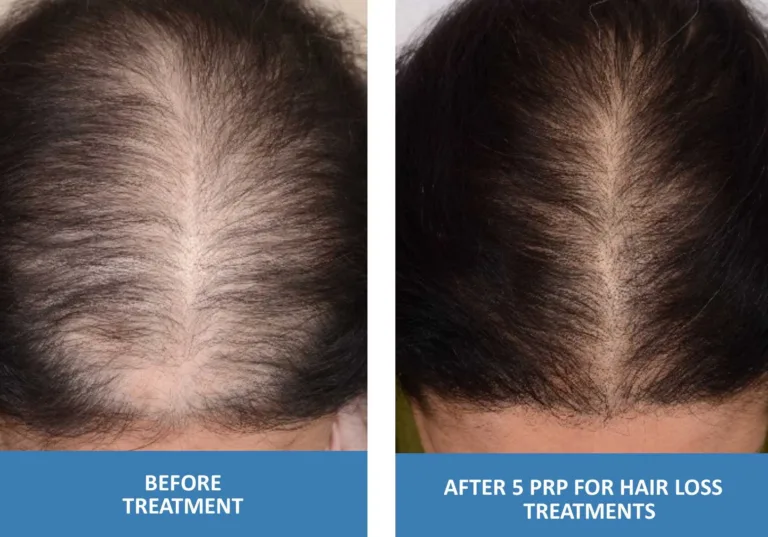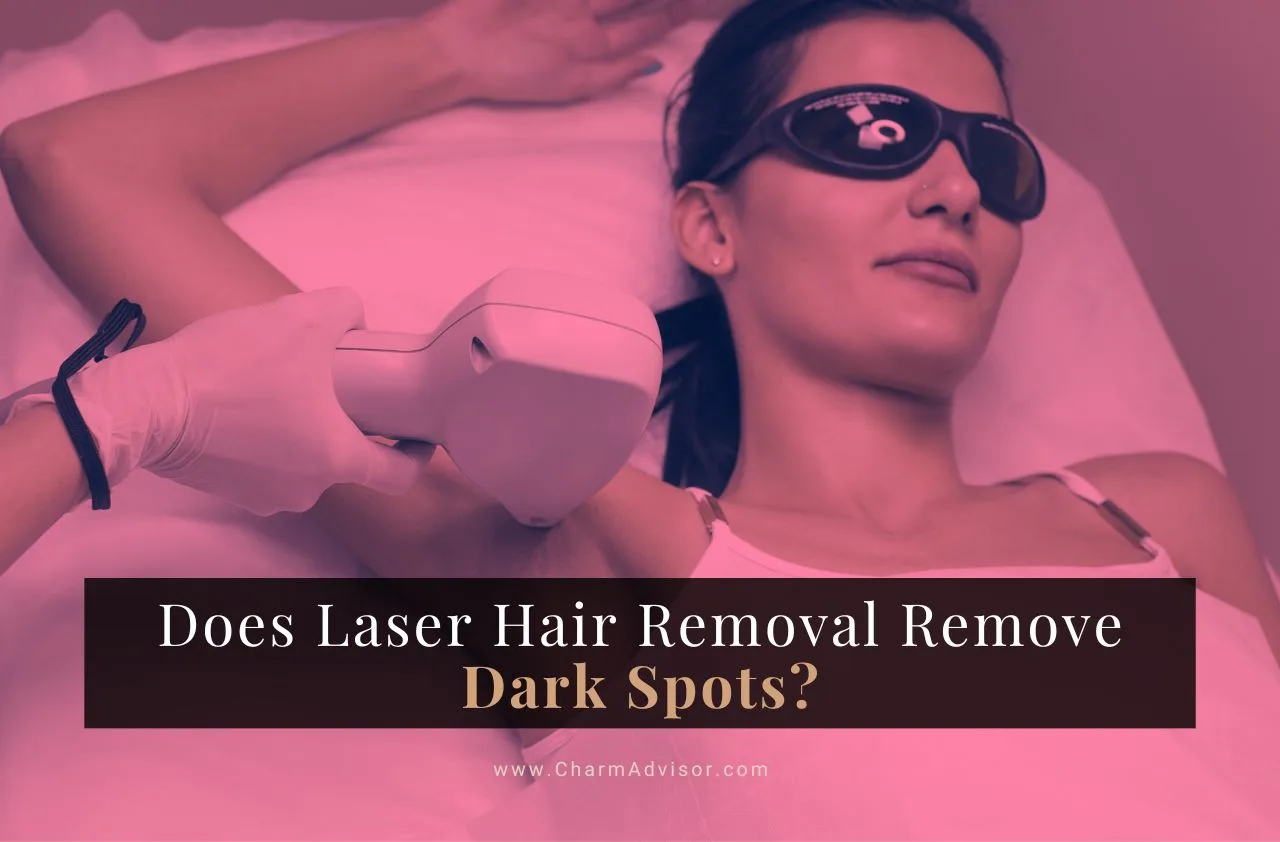
Looking for a permanent solution to unwanted hair? Laser Hair Removal might be the answer! But in addition to hair removal, many people wonder if it also helps with dark spots.
In this blog, we’ll explore the question, “Does Laser Hair Removal Remove Dark Spots?” Stick around to find out the answer and learn more about the how does laser hair removal work? what causes dark spots & Skin Discoloration, and the best treatment options.
Laser hair removal is one of the most sought-after cosmetic treatments, providing permanent reduction of unwanted body and facial hair. But many who undergo laser treatment are also looking to erase dark spots, acne scars, sunspots, and generally uneven skin tone.
Can the laser lights not only remove hair, but also improve hyperpigmentation by fading age spots and skin discoloration?
Unfortunately, the answer is no. Laser hair removal devices are engineered to solely target melanin pigment in the hair follicle – not melanin in the skin itself. So while laser can effectively clear hair from large areas, it does not eliminate dark spots or skin pigmentation.
Keep reading to understand exactly how laser hair removal works, why it cannot remove dark spots, and safe options to treat skin discoloration and create a smooth, even complexion.
Table of Contents
How Does Laser Hair Removal Work?
Laser hair removal utilizes selective photothermolysis technology to permanently stop hair growth by disabling the hair follicles.
A high-intensity laser emits a concentrated beam of light that selectively targets the melanin pigment in hair follicles, absorbing into them. This creates heat that damages the hair follicle, preventing it from producing new hair.
Treatments involve exposing each area of unwanted hair growth to the laser for just milliseconds at a time. The treatments must be spaced out over several weeks because hair grows in phases and the laser only impacts actively growing hairs. With consistent treatments, most patients achieve a long-term reduction of around 90% of targeted hair.
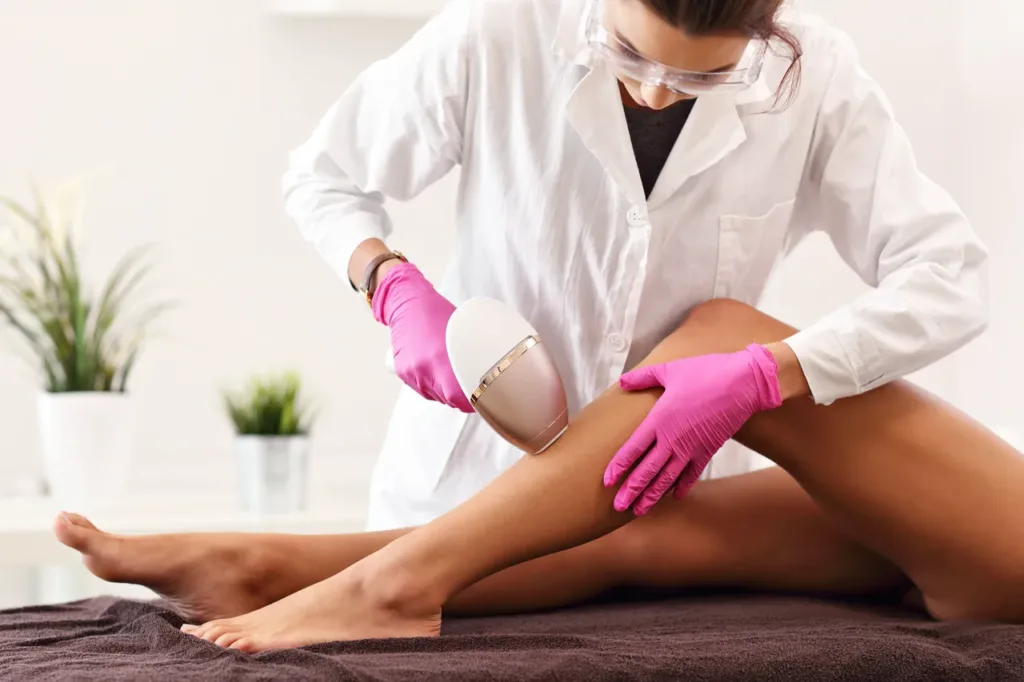
But how does the hair removal laser differentiate between melanin in hair versus melanin in skin pigmentation? The truth is, it doesn’t at all.
Why Laser Hair Removal Doesn’t Remove Skin Pigmentation
There are a few key reasons why laser hair removal does not eliminate dark spots or treat hyperpigmentation:
- Targets hair melanin only – The laser systems engineered for permanent hair reduction can only recognize melanin pigment in the hair follicle, not the melanin in skin pigmentation.
- Different melanin locations – The melanin in hair follicles sits in the dermis, the middle layer of skin. But the melanin that causes skin discoloration resides in the epidermis, the top outer layer.
- Cannot treat epidermal pigmentation – Since lasers for hair removal are designed to target the mid-dermal layer, they cannot address pigmentation issues in the outer epidermal layer where dark spots occur. This requires different technologies.
- Dark spots need different approaches – The causes and composition of skin pigmentation like sunspots, acne marks, and melasma require alternative treatment methods beyond just targeting melanin.
So in summary, while laser hair removal is outstanding for removing large volumes of dense, dark hair, it does not have any effect on removing or lightening existing dark spots, hyperpigmentation, sunspots, age spots, or acne marks.
You can learn more about Laser Hair removal in these articles below:
What Causes Dark Spots & Skin Discoloration?
Dark spots and skin discoloration occur due to an overproduction of melanin pigment in certain areas of the skin. This hyperpigmentation can show up in a variety of forms:
- Freckles – Flat, light brown spots from sun exposure.
- Age spots – Darker brown spots that develop with aging.
- Melasma – Blotchy patches often stemming from hormonal changes.
- Acne marks – Red or brown spots leftover from inflamed breakouts.
- Sunspots – Areas of pigmentation induced by UV rays.
These types of marks and patches arise when the body overproduces melanin pigment in the area as a form of protection.
Several factors can trigger melanin overproduction and cause hyperpigmentation:
Sun Exposure and UV Damage
Dark spots are the skin’s response to shield itself from UV radiation. Areas that are more frequently exposed to the sun – such as the face, chest, hands, and arms – often develop more hyperpigmentation over time.
Both UVA and UVB rays will stimulate melanin production. Tanning beds emit UV radiation as well.
Inflammation and Skin Injuries
Inflammatory skin conditions like acne and eczema can spur dark spots when the skin overcompensates with melanin during healing. Marks may be left behind after a breakout clears.
Other skin injuries, burns, and trauma can also cause post-inflammatory hyperpigmentation by setting off the melanin response.
Aging Skin
As skin ages and cell turnover slows, dark spots are more likely to form and last longer. Liver spots or sunspots often crop up in older adults and are difficult to fade.
Hormonal Changes
Pregnancy, menopause, and birth control pills can prompt hormonal fluctuations that bring about melanin production and hyperpigmentation. Disorders like PCOS or thyroid dysfunction can also impact hormones in ways that spur pigmentation.
Genetic Predisposition
Some individuals are just genetically prone to developing more dark spots and discoloration even without the common triggers. Those with medium to darker skin tones see hyperpigmentation more readily due to naturally higher melanin levels.
Treatments to Safely Remove Dark Spots & Improve Skin Tone
Now that we understand why laser hair removal does not treat hyperpigmentation, what are the ways to safely reduce dark spots and improve tone for a flawless complexion?
There are a variety effective treatments both at home and performed professionally that can specifically target and gradually fade skin discoloration.
At-Home Skin Lightening Creams
Consistently using specialized over-the-counter creams can help control melanin production and steadily lighten dark spots over time:
| Treatment | Description | Key Benefits |
|---|---|---|
| At-Home Skin Lightening Creams | Specialized over-the-counter creams to control melanin production and lighten dark spots over time. | Gradual, safe lightening of dark spots |
| – Hydroquinone Creams | Inhibits melanin by blocking tyrosine production. Concentrations: 2-4% | Effective and gradual lightening |
| – Vitamin C Serums | Restricts melanin formation enzyme. Contains 10-15% L-ascorbic acid. | Prevents new dark spots |
| – Retinoids | Exfoliates pigmented cells and inhibits melanin. Start with 0.025-0.1% retinol. | Gradually reduces dark spots |
| – Niacinamide | Decreases melanin transfer to skin cells. Use 5-10% niacinamide daily. | Gentle and effective |
| – Kojic Acid | Prevents tyrosine activity and melanin production. Concentrations: 1-4%. | Similar to hydroquinone, more unstable |
| Expert Recommendation | A board-certified dermatologist can customize a treatment plan based on individual skin type and causes of hyperpigmentation. | Combining multiple approaches often yields the best results. |
Hydroquinone Creams
Hydroquinone is considered the gold standard for inhibiting melanin. It works by blocking tyrosine, an amino acid essential for melanin production. Hydroquinone concentrations between 2-4% can safely and gradually lighten dark spots when used correctly.
Vitamin C Serums
Vitamin C is a powerful antioxidant that restricts an enzyme required for melanin formation. Look for serums with 10-15% L-ascorbic acid. Apply daily and combine with sunscreen to prevent new dark spots.
Retinoids
Retinol and retinoids exfoliate away pigmented skin cells and prevent new ones from forming through melanin inhibition. Start with an over the counter 0.025-0.1% retinol cream and gradually increase strength.
Niacinamide
Also known as vitamin B3, niacinamide minimizes dark spots and hyperpigmentation by decreasing melanin transfer to skin cells. It’s gentler than hydroquinone. Use a 5-10% niacinamide concentrate daily.
Kojic Acid
Derived from fungi, kojic acid prevents tyrosine activity and melanin production. It has similar effects as hydroquinone but is more unstable. Creams with 1-4% kojic acid can lighten spots with consistent use.
Professional Skin Treatments
For more stubborn dark spots or faster results, dermatologists offer several clinic procedures to erase hyperpigmentation:
To create a table summarizing the content about treatments to safely remove dark spots and improve skin tone, you can use the following format:
| Treatment | Description | Key Benefits |
|---|---|---|
| Professional Skin Treatments | Dermatologist-performed procedures for stubborn or fast results. | Targeted treatment options |
| – Chemical Peels | Exfoliate pigmented skin to reveal even-toned skin. Various depths available. | Effective and controlled treatment |
| – Microdermabrasion | Minimally invasive, sanding away pigmented skin’s top layer. Requires a series of treatments. | Promotes collagen and elastin growth |
| – Laser Skin Resurfacing | Targets pigmented cells without harming surrounding skin. Ablative and non-ablative options. | Minimal downtime with non-ablative lasers |
| – Intense Pulsed Light (IPL) | Emits broad-spectrum light to break up melanin clusters. Requires multiple sessions. | Gently fades dark spots |
| Expert Recommendation | A board-certified dermatologist can customize a treatment plan based on individual skin type and causes of hyperpigmentation. | Combining multiple approaches often yields the best results. |
This table provides a clear summary of the different treatments available for dark spot removal and their key benefits. Visual elements such as borders or shading can be added for clarity and aesthetics.
Chemical Peels
Chemical peels exfoliate away the top layer of pigmented skin to reveal fresh, even-toned skin underneath. Different depth peels are used depending on the severity of spots. Light peels require little down time, while deeper peels lead to several days of peeling skin.
Microdermabrasion
Microdermabrasion is a minimally invasive treatment that uses a handheld wand to gently sand away the outermost layer of pigmented skin. This triggers new collagen and elastin to form and generates fresher skin. A series of treatments is usually needed for significant lightening of spots.
Laser Skin Resurfacing
Lasers can remove dark spots by targeting just the pigmented cells without damaging surrounding normal skin. Both ablative and non-ablative lasers are options. Ablative lasers peel off the outer layers while non-ablative work below the skin’s surface. Downtime is minimal with non-ablative lasers.
Intense Pulsed Light (IPL)
IPL devices emit broad spectrum light that can gently break up melanin clusters causing hyperpigmentation. The technology avoids harming the top layer of skin. Multiple sessions spaced 3-4 weeks apart provide optimal dark spot fading.
A board certified dermatologist can recommend the most effective treatment plan depending on your individual skin type and causes of hyperpigmentation. Combining several of these approaches often provides the best results.
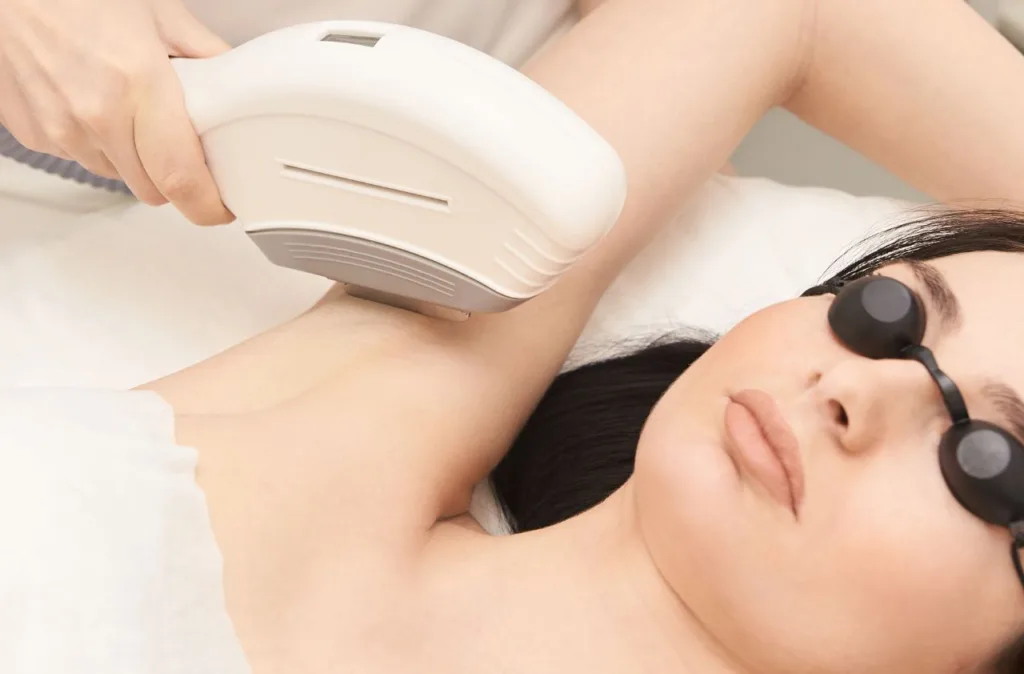
This table provides a clear summary of the different treatments available for dark spot removal and their key benefits. Visual elements such as borders or shading can be added for clarity and aesthetics.
Can Laser Hair Removal Cause Dark Spots?
Laser hair removal treatments very rarely lead to hyperpigmentation or dark spots developing. But there are a few scenarios where it can occur:
- The laser settings are calibrated too high for the individual’s skin tone and type. Darker settings risk burning and blistering which may spur pigmentation as the skin heals.
- Treatment is performed by an inexperienced technician who does not properly adjust the laser’s wavelength, duration, and cooling for the patient’s needs.
- Patients with darker skin tones undergoing laser hair removal have a higher risk of laser-induced hyperpigmentation due to higher baseline melanin levels.
Choosing an experienced, licensed dermatologist or technician is imperative. With advanced laser devices and proper settings tailored to your skin, there is minimal chance of developing any new pigmentation or dark spots due to the hair removal treatment.
Why Removing Dark Spots Matters
Aside from cosmetic concerns related to an uneven complexion, reducing dark spots can also provide health benefits.
Key reasons you may want to fade hyperpigmentation:
- Prevents accelerated aging – Sunspots and age spots are direct signs of UV skin damage that ages skin faster. Lightening them helps slow the aging process.
- Lowers skin cancer risk – Spots from chronic sun exposure are pre-cancerous lesions that could eventually develop into melanoma without proper treatment.
- Improves self-confidence – Those with moderate to severe facial hyperpigmentation are often self-conscious of their appearance. Safely lightening spots can boost self-esteem.
- Reduces inflammation – Inflammatory hyperpigmentation from conditions like acne and eczema signifies ongoing skin inflammation. Correcting it helps resolve the source inflammation.
The Takeaway: Does Laser Hair Removal Remove Dark Spots?
Laser Hair Removal Does Not Treat Dark Spots, while laser hair removal is an outstanding treatment for achieving permanent hair reduction across the legs, arms, bikini area, and more, it has no effect on removing or lightening existing dark spots or hyperpigmentation.
This is because laser hair removal devices target melanin pigment deep in the hair follicle only and cannot address melanin in the upper layers of skin that cause age spots, sunspots, acne marks, melasma, and other discoloration.
Instead, dark spots must be treated with skin lightening creams, chemical peels, laser resurfacing, and other techniques aimed at controlling melanin production in the epidermis.
If uneven pigmentation or dark spots are negatively impacting your appearance and self-confidence, meet with a dermatologist. They can assess your individual condition and develop a treatment plan using the most effective methods to fade spots for a flawlessly smooth, even complexion.
You can safely achieve both silky smooth skin free of unwanted hair growth and troublesome dark spots for a luminous, youthful glow.
FAQs:
Does Laser Hair Removal Remove Dark Spots?
While laser hair removal can permanently reduce hair growth, it does not treat existing skin pigmentation or fade dark spots, sunspots, acne marks and other hyperpigmentation.
Does laser hair removal get rid of dark spots on legs?
No, laser hair removal does not get rid of existing dark spots or skin pigmentation on the legs or any other area of the body. It only removes hair by targeting melanin in the hair follicle, not melanin in the skin. Other treatments need to be used to lighten dark spots on legs.
Can laser treatment remove acne scars and marks?
Unfortunately laser hair removal does not treat acne scarring or post-inflammatory hyperpigmentation from acne. The laser only targets hair follicles. Procedures like laser skin resurfacing or microneedling work better to reduce the appearance of acne scars.
Does laser therapy lighten age spots and liver spots?
Laser hair removal has no effect on lightening age spots, liver spots or other skin pigmentation related to aging. It cannot eliminate existing dark spots since it only affects hair follicles. Skin lightening creams or chemical peels need to be used to fade age spots.
How can I prevent laser hair removal from causing dark spots?
To avoid the risk of laser induced hyperpigmentation, work with an experienced technician who will properly adjust the laser settings and wavelength for your individual skin type. Avoid tanning before treatment. Follow all pre and post treatment care instructions.
Can those with dark skin safely undergo laser hair removal?
Yes, those with darker skin can safely have laser hair removal but need an experienced professional who can calibrate the laser appropriately for skin tone. Avoiding tanning beforehand reduces risk of post-treatment pigmentation problems.
Why does my skin still have dark spots after laser hair removal?
Skin may still show dark spots, acne marks or other pigmentation after laser hair removal because this treatment only removes hair, not existing skin discoloration. Combine laser with other products/procedures that specifically target melanin in the skin to reduce dark spots.

